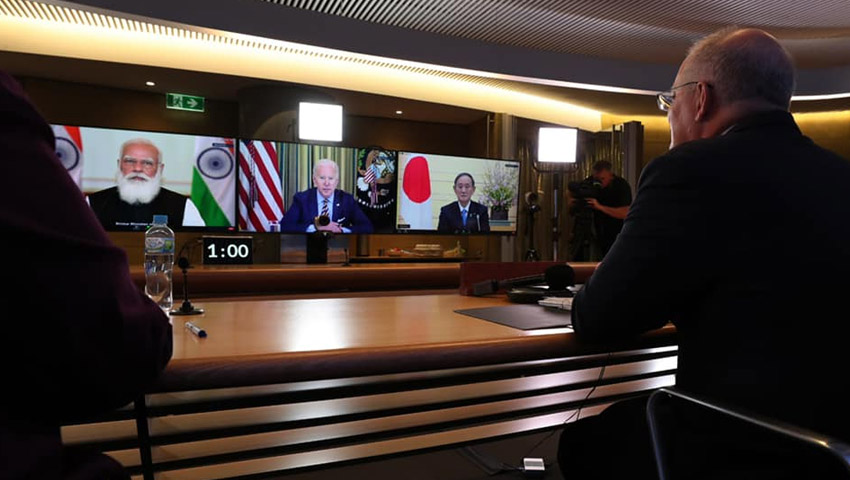Australia is poised to benefit from the Biden administration’s renewed sense of urgency in the international arena, one analyst observes.
To continue reading the rest of this article, please log in.
Create free account to get unlimited news articles and more!
According to Michael Shoebridge, director of the defence, strategy and national security program at the Australian Strategic Policy Institute (ASPI), US President Joe Biden is in a rush to deliver on the world stage, employing ‘fast multilateralism’ to advance his administration’s geopolitical agenda.
Shoebridge observes that since assuming office in January, the 46th president has been quick to engage with allies, including Australia, to build a strategic consensus as a means to expediting the decision making processes.
This approach, Shoebridge writes, was exemplified through the Quad leader’s meeting, with Biden seeking unity on key issues, including the COVID-19 vaccine rollout and the building of supply chain resilience.
“One reason Biden will have chosen the Quad as the right grouping for this work is that, while its brand new as a leaders’ forum, it has the unity and sense of urgency these challenges require,” he writes.
Shoebridge also notes a similar ‘fast multilateralism’ employed as part of US preparation for engagement with China, with the Biden administration consulting with Japan, South Korea, and other key allies to “set the scene” for the Alaska meeting with CCP representatives.
“[A] signature feature of Biden’s international action will be that it values momentum and delivery. Process and consultation are being seen much less as values in themselves than many may have expected,” Shoebridge continues.
“Out of this, as with US domestic policy, Biden judges that unity of purpose and action will be the likely result, not just at the political level, but at the population levels in the US and its allied and partner communities.
“That’s a deeper unity that’s more likely to last and affect underlying trends.”
He adds: “This is a big call and a very new a way of operating. It shows us that the Biden administration understands that taking some big risks is what the current strategic environment requires, and that the opportunity costs of not doing so are high.”
Shoebridge goes on to claim that Australia is poised to benefit from Biden’s ‘fast multilateralism’, adding that Canberra must capitalise on this new approach to advance the nation’s own interests.
“For Australia as a US ally with some very clear overlaps in our national interests that map to Biden’s priorities, this is both challenging and good news, because it creates enormous opportunities for us politically, economically, technologically and for our security,” he writes.
“Prime Minister Scott Morrison can position Australia as one of the primary contributors to Biden’s free and open Indo-Pacific initiative by taking some fast, hard-nosed decisions to enable closer US–Australian maritime operations, and to enmesh the rebuilding of Australia’s economy with the huge stimulus-driven rebuilding Biden is undertaking.”
Shoebridge outlines a number of policy initiatives which Canberra could promote in its dialogues with Washington, beginning with a policy that establishes Darwin as a major port, in a bid to support a larger Australian, US and Japanese naval presence.
“This will work with the grain of Biden’s global force posture review, which in our region is about enabling the US military to operate and be sustained from more dispersed locations, notably in south-east Asia. Darwin makes strategic sense here,” he observes.
“Interestingly, this port package might be cheaper than expected, because a set of ad hoc planned investments by government and private actors has the bones of a master plan already.
“They just require orchestration. It’d help with Australian engagement with Southeast Asian partners, with momentum coming out of both the US and Japan.”
Shoebridge also proposes that Canberra puts forward a plan on quantum technologies, which complements the US’ own national security objectives and invests in Australia’s research and development community.
“Quantum makes sense because it’s probably one of the ‘commanding heights’ of future technology that will determine national power and prosperity,” he writes.
“[That] could be a package that’s about accelerating key new capabilities into service with the Australian and US militaries, with core items being co-production of advanced missile systems to reduce supply risks in conflict, rapid movement from development to production of hypersonic missiles, responsive space systems like small satellites, and a joint program on unmanned undersea systems like Boeing’s Orca.
“This package would also deliver on the government’s drive to give the Australian military more offensive firepower sooner than the mid-2030s.”
Finally, the ASPI analyst noted that Australia and the US could together leverage critical infrastructure, digital technologies, renewable energy, and natural resources to “remove key supply-chain vulnerabilities”.
Shoebridge concludes: “There’s time, but not much time, for Australia to get ahead of Team Biden and benefit from the momentum of working with our huge US partner.
“Let’s be company that contributes — in our interests and for our joint prosperity and security.”
Get involved with the discussion and let us know your thoughts on Australia's future role and position in the Indo-Pacific region and what you would like to see from Australia's political leaders in terms of partisan and bipartisan agenda setting in the comments section below, or get in touch with
Charbel Kadib
News Editor – Defence and Security, Momentum Media
Prior to joining the defence and aerospace team in 2020, Charbel was news editor of The Adviser and Mortgage Business, where he covered developments in the banking and financial services sector for three years. Charbel has a keen interest in geopolitics and international relations, graduating from the University of Notre Dame with a double major in politics and journalism. Charbel has also completed internships with The Australian Department of Communications and the Arts and public relations agency Fifty Acres.

 Login
Login








